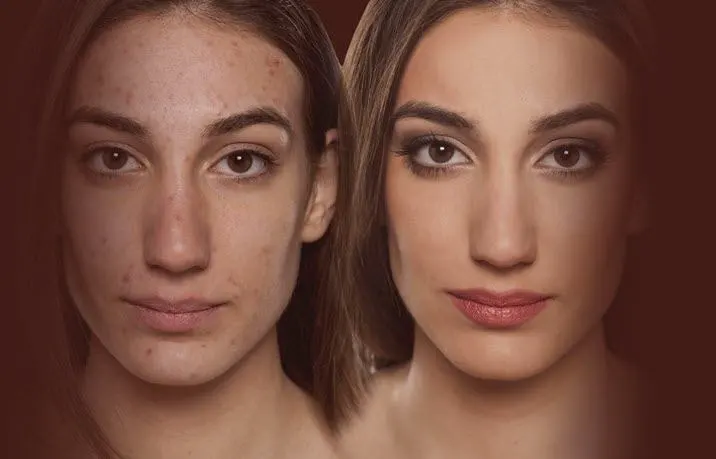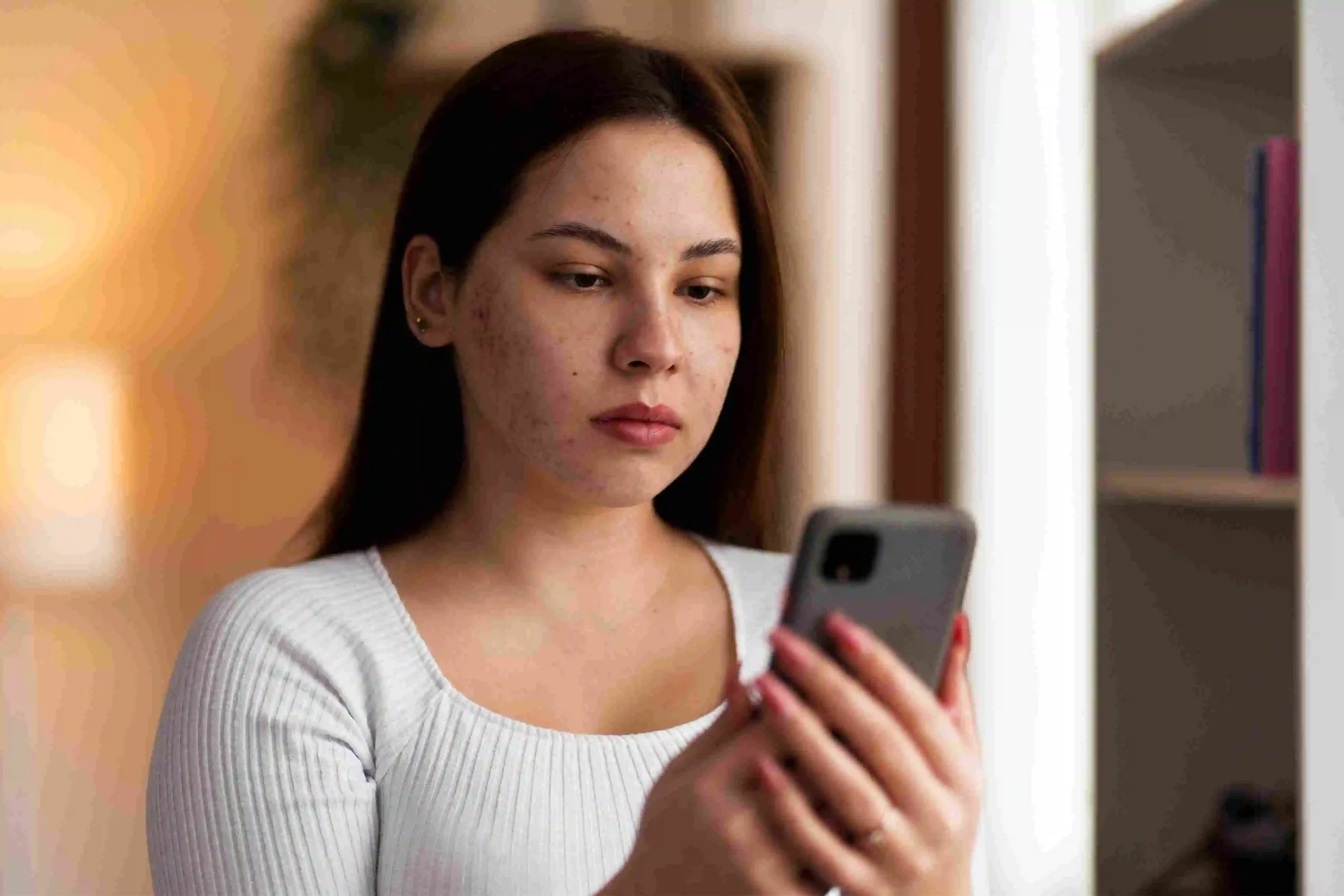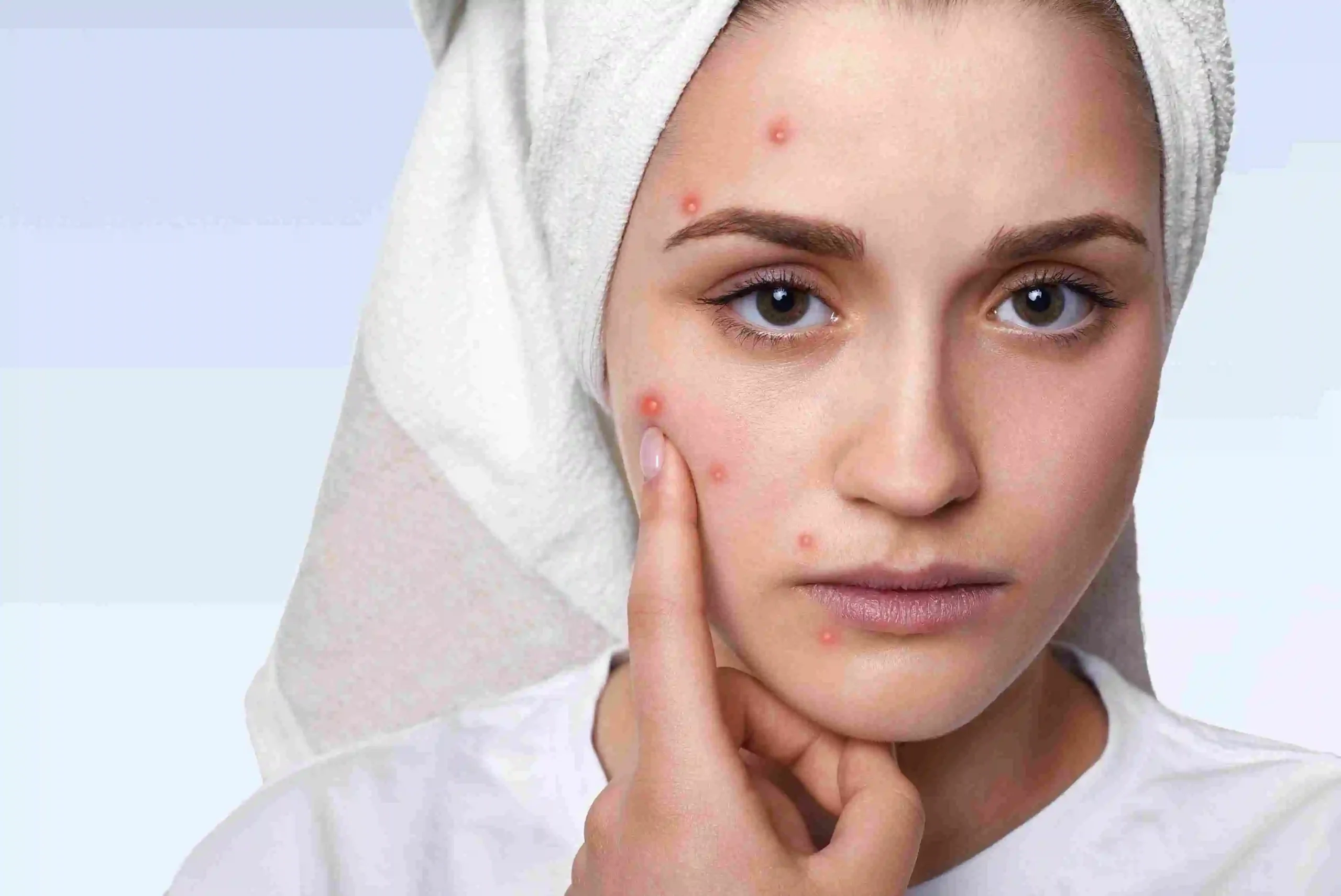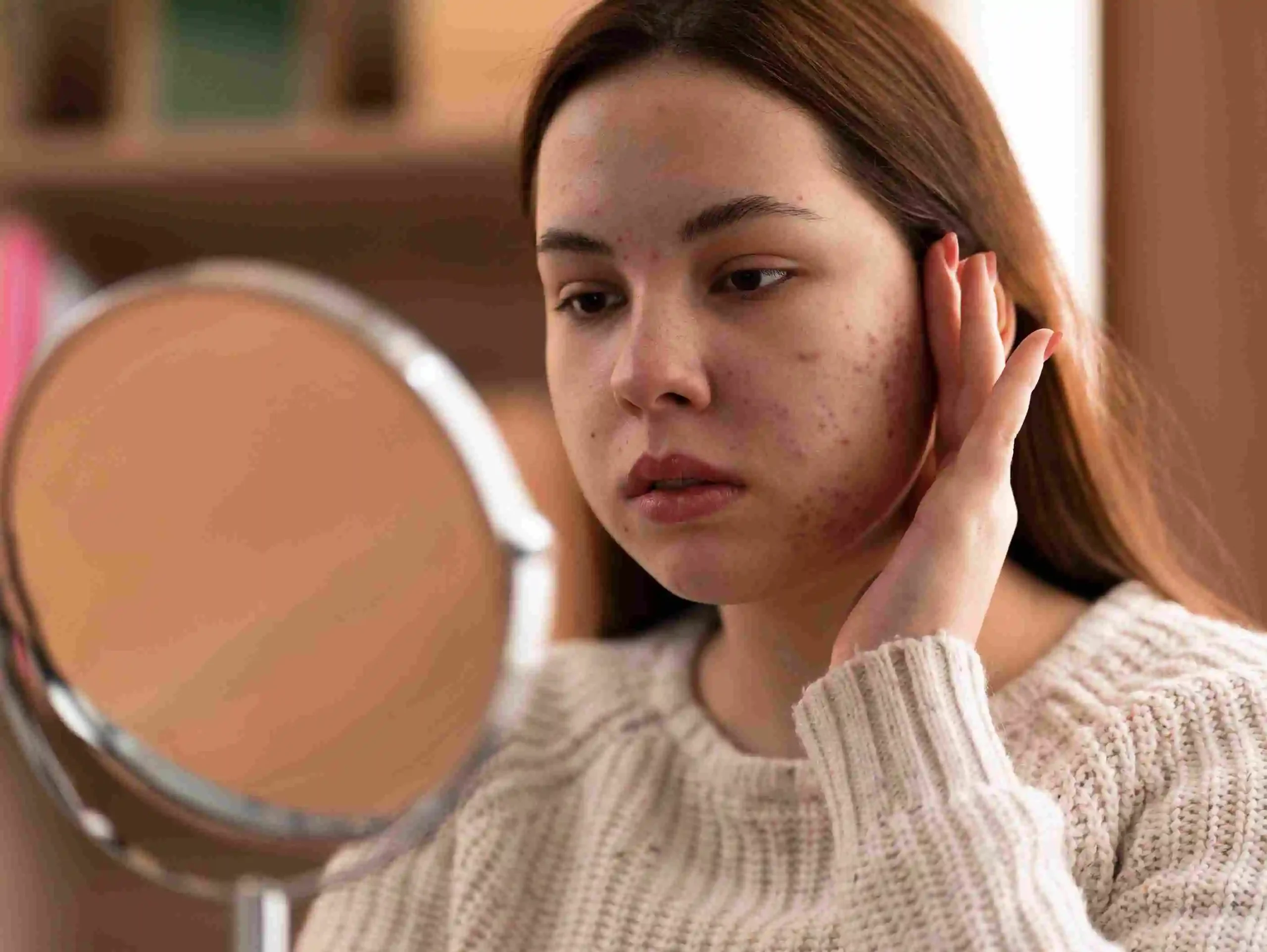Your Acne-Free Journey Begins Now
Laser Acne Treatment in Riyadh
Get the Skin You’ve Always Wanted!
Read in Arabic
Millions of individuals throughout the world struggle with acne, a frustrating skin ailment that can undermine confidence. Despite the abundance of over-the-counter and prescription remedies, some people could still have trouble getting relief. Laser acne treatment can help with that. Focused light beams are employed in this cutting-edge medical method to target and treat acne.
It has shown promising results in reducing active outbreaks and enhancing the look of acne scars. The ins and outs of laser acne treatment will be covered in this article, along with how it functions, what to anticipate during the procedure, and whether it is a good option for you.
Procedure Time
40 Mins
Downtime
3 - 5 Days
Back to Work
1 - 2 Days
Results
4 - 6 Months
What is a Laser Acne Treatment?
Laser acne treatment is a procedure that uses high-energy light to target and reduce acne. A dermatologist will use a laser during the procedure to pierce the skin and kill the acne-causing germs. The laser’s heat also lessens swelling and encourages collagen development, which can lessen the appearance of acne scars.
Infrared, red, and blue light lasers are some of the varieties of lasers used to cure acne. The kind of laser that is employed depends on the patient’s skin type and the severity of the acne.
Although most people believe laser acne therapy to be safe and effective, not everyone may be a good candidate. A dermatologist should be consulted to ascertain whether this course of treatment is appropriate for you. In addition, it could take several sessions to get the desired outcomes.
Who Needs Laser Acne Treatment?
If you have moderate to severe acne and have tried topical or oral drugs without much success, you may be a candidate for laser acne therapy. For those who have acne scars or hyperpigmentation brought on by acne, it may also be an option.
Yet, not everyone should receive laser therapy. Those with particular skin types, such as those with dark skin tones or those who are prone to keloid scarring, may not be able to use it. If you want to know if laser acne treatment is right for you, you should speak with a dermatologist.
Your Acne-Free Journey Begins Now - Schedule Your Laser Treatment at Enfield Royal Clinic Saudia!
Types of Laser Acne Treatment
There are various laser acne treatment options, such as:
Blue Light Therapy
This procedure uses a blue light to eradicate the acne-causing germs. It is frequently used with a photosensitizing agent, which improves the effectiveness of the treatment.
Pulsed-Dye Laser Therapy
This procedure focuses on the skin’s blood vessels that cause irritation due to acne. Also, it helps make acne scars look less noticeable.
Fractional Laser Therapy
This procedure employs a laser to make minute lesions in the skin, causing the body to produce collagen and speed up the healing process. The texture and look of acne scars can be improved by doing this.
Carbon Dioxide laser therapy
For severe cases of acne or acne scarring, carbon dioxide laser therapy is performed. The top layer of skin is removed using a high-energy laser, allowing new, smoother skin to develop in its place.
To find out which kind of laser acne treatment is appropriate for your particular needs and skin type, it is crucial to speak with a dermatologist.
Does Laser Treatment for Acne Scars Work?
Absolutely, using a laser to heal acne scars can help them look less noticeable. In order to target and remove scar tissue, a laser treatment uses a concentrated beam of light. This process activates the body’s natural healing process and encourages the development of new, healthier skin.
Acne scars can be treated using a variety of laser procedures, such as fractional laser resurfacing, pulsed dye laser therapy, and ablative laser resurfacing. The form and severity of the acne scars, as well as other individual characteristics like skin type and sensitivity, will determine the particular type of laser treatment employed.
Although laser treatment might be useful for lessening the look of acne scars, it is crucial to remember that outcomes can vary and that it might take several sessions to get the desired impact. To reduce the risk of problems and increase the efficacy of the therapy, it is also crucial to adhere to the right post-treatment care guidelines and prevent sun exposure.
What is The Procedure for Laser Acne Treatment?
Depending on the type of laser being utilized and the severity of the acne scars, the laser acne treatment technique may change. Nonetheless, the following are the general processes for laser acne treatment:
- Consultation: To find out if you are a good candidate for laser acne treatment, you will first have a consultation with a dermatologist or laser specialist. To choose the best course of action, they will evaluate your skin type, acne scars, and medical background.
- Preparation: Your skin will be washed and any creams, lotions, or makeup removed before the process. To reduce discomfort during the process, some lasers might need to be used with a topical anesthetic cream.
- Laser therapy: During the procedure, the laser will be pointed at the skin’s acne scarred regions. The laser radiation will penetrate the skin, focusing on the scar tissue and promoting the synthesis of collagen, which can help the scars look better. The length of the treatment might range from a few minutes to an hour, depending on the type of laser employed.
- Post-treatment care: Following the surgery, you will receive advice on how to take care of your skin as it heals. This can entail staying out of the sun, using mild skincare products, and temporarily skipping activities like swimming or exercising. To promote the best possible healing and outcomes, it is crucial to adhere to these guidelines.
- Follow-up procedures: Many sessions may be required to get the desired results, depending on the severity of the acne scars and the type of laser treatment performed. You will receive advice from your dermatologist or laser specialist regarding the recommended number of sessions and how frequently you should schedule follow-up visits.
Benefits of Laser Acne Treatment
For those with acne scars, laser acne therapy can offer a number of advantages, including:
- Better appearance: Laser treatment can lessen acne scarring, leaving skin that is smoother and more even.
- Non-invasive: Laser treatment is non-invasive and does not require any downtime, in contrast to certain other acne scar treatments that require incisions or surgery.
- Minimal discomfort: A topical numbing cream or other pain-management measures can be used to minimize any little discomfort that may occur during the laser treatment.
- Safe for most skin types: Most skin types can benefit from laser acne therapy, while the specific laser utilized may change based on the skin’s sensitivity and color.
- Stimulates collagen production: Laser treatment can assist to increase the creation of collagen in the skin, which can help to enhance the skin’s general texture and tone.
- Rapid improvement: Laser treatment can significantly lessen the appearance of acne scars very rapidly, while it may take several sessions to see the desired results.
- Decreased risk of scarring: By promoting healing and lowering inflammation, laser treatment can lower the risk of creating new scars or additional scarring of acne scars.
Before After Results

Side effects of Laser Acne Treatment
Skin laser treatment is an ultimate solution for your acne, but it also has some side effects, which are as follows:
- Redness and swelling: Following a laser treatment, it is normal to notice some redness and swelling in the treated area. Usually, this gets better within a few hours to a few days.
- Itching and discomfort: During the healing process, some people may experience itching or discomfort in the treated area. Typically, topical creams or over-the-counter painkillers can manage this.
- Skin color changes: In some situations, laser treatment can result in short-term or long-term skin color alterations, especially in those with darker skin tones. This may involve either hyper pigmentation or skin darkening known as hyperpigmentation (lightening of the skin).
- Scarring: Although laser acne therapy is typically thought to have a low risk of leaving scars, there is a very small chance that it could result in permanent skin damage or scarring.
- Infection: Although extremely unlikely, there is a chance of infection after laser acne therapy. By adhering to the recommended post-treatment care recommendations, this risk can be reduced.
- Sun sensitivity: The treated area may be more sensitive to sunlight after receiving laser treatment, increasing the risk of sunburn and other skin damage.
Why do I Get Acne After a Laser?
After laser therapy, acne can develop for a number of causes that are not always related to the laser therapy itself. After laser therapy, a person could have acne for the following reasons:
- Skin irritation: The use of laser therapy may temporarily irritate and inflame the skin, which may result in blocked pores and the development of acne.
- Extended sun exposure: Following laser therapy, it is crucial to prevent lengthy sun exposure and protect the treated region with sunscreen. Failing to do so may cause skin damage and raise your risk of developing acne.
- Hormonal changes: Although they might not be directly connected to laser treatment, hormonal changes might also contribute to the emergence of acne.
- Bacterial infection: Rarely, bacterial infections that follow laser treatment may manifest themselves, which may result in the emergence of acne.
What is The Cost of Laser Acne Treatment in Riyadh?
Laser Acne Treatment
Starting FromLaser Acne Treatment
StandardThe cost of laser acne treatment in Riyadh may vary based on a number of variables, including the clinic’s location, the practitioner’s training and expertise, the kind of laser used, and the severity of the acne. In Saudi Arabia, a single laser acne treatment session might cost anywhere between SAR 500 and SAR 3000. But, for the best outcomes, numerous sessions could be necessary, and the overall expense can mount.
Why Choose Us?
It is very important to go for the right dermatologist in order to get yourself the best treatment. At Enfield Royal Saudia, you will find the best dermatologist who provides the best service and satisfies their patients with their work.
Best Dermatologist in Riyadh
It is important for us to provide our patients full satisfaction, therefore, we have the best dermatologist who are highly qualified and experienced. We provide the greatest customer service in the area and work closely with our patients in every aspect.
Cheap Skin Clinic in Riyadh
In Riyadh, Enfield Royal Saudia is not only the best skin clinic, but also the most affordable. with respect to other clinics. You can receive treatment on a budget because of the adaptability and affordability of our prices.
FAQs.
Lasering a pimple is not advised since it may cause more inflammation, scarring, and harm to the nearby skin. Instead of treating active zits, lasers are mainly employed for more severe acne scars. For optimal acne control, it is advised to either utilize topical medications or speak with a dermatologist.
While laser treatment may not be the most efficient or suitable treatment for blackheads, there is no single “best” laser for them. Blackheads are often brought on by excessive oil production and dead skin cells clogging pores. Topical retinoids, salicylic acid, and other over-the-counter or prescription acne medicines are frequently used to treat blackheads.
In order to find the best course of action for their unique skin type and issues, a person who wants to have laser therapy for their blackheads may think about speaking with a dermatologist.
Intense pulsed light (IPL), which can help to reduce pore size and improve overall skin texture, and carbon dioxide (CO2) lasers, which can help to exfoliate the skin and encourage collagen development, are two examples of laser treatments that may be used for blackheads.
On the other hand, it is crucial to keep in mind that laser treatment for blackheads is not commonly regarded as a first-line treatment choice and might not be efficient for everyone.
After receiving laser treatment, popping pimples is not advised since it can cause more skin damage, scarring, and irritation. The skin may become temporarily irritated and inflamed after receiving laser treatment, and popping pimples may make the irritation worse and increase the risk of infection. Moreover, the skin may be more delicate and prone to injury after receiving laser treatment, and popping pimples can further harm the skin. It is best to refrain from touching or picking at the treated area and to adhere to the dermatologist’s post-treatment care instructions
Relevant Treatments.

Laser Scar Removal For Acne Scar in Riyadh
Have you ever found yourself doubting the enduring scars acne leaves behind while gazing in the mirror? Are you curious about a miracle cure to get that perfect skin back? We’re going to reveal the benefits of Laser Scar Removal for Acne Scars in Riyadh. A revolutionary cosmetic surgery called laser scar removal is intended to reduce or completely

Acne Treatment in Riyadh
Ready to unlock the secret of radiant skin? Our Acne treatment in Riyadh provides flawless skin. Welcome to the realm of flawless skin, where every journey begins with confidence. At our doorstep, we greet you with the promise to transform your acne woes into radiance and insecurities into your strength. To know more about this treatment give a brief reading of
Relevant Posts.

Pros And Cons Of Laser Acne Scar Is It Right For You
Are you sick of covering up those scars from acne? Explore the benefits and drawbacks of laser acne scar treatment in Riyadh. Find out why people are adopting this creative approach. Learn more about the Pros and Cons of Laser Acne Scar is it right for you? A dermatological technique called laser acne scar treatment aims to improve the general texture and tone of your skin while also lessening the visibility of acne scars. This novel method targets and treats surface scars on your skin using laser technology.




